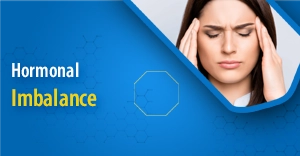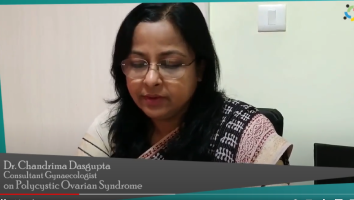The time in the life of women when periods stops, and they no longer get pregnant naturally is called menopause. It is part of natural ageing. Menopause usually occurs at 45 to 55 years of age. It is a natural process and appears as ovaries age and produces less estrogen. The main reason is a decline in estrogen levels. You may have menopause suddenly. In some women, periods become less frequent for a few months or years and then stop. In medical terms, menopause is when you have had no periods for 12 successive months or a year.
Free Doctor Assessment
Symptoms of Menopause
Following are some of the symptoms of menopause:
- Alterations in menstrual periods: This would probably be the first sign of menopause. The women undergoing menopause may not have regular periods. The periods may either be longer or shorter. Further, the bleeding may also be abnormal, i.e., it may either be less or more. Although these changes are normal during menopause, you must consult a doctor if you experience heavy bleeding, spotting, a very small gap between the periods, and an extended period of bleeding.
- Bladder incontinence: One of the symptoms of menopause is bladder incontinence. However, it may also be due to various causes, such as urinary tract infections. The patient may experience urinary leakage or extreme urge for urination during laughing or exercising. It is necessary to consult the doctor.
- Problem sleeping: Getting good sleep is sometimes difficult for menopausal women. The sleep can be disrupted by anxiety, night sweats, or increased need to urinate. It is one of the symptoms of menopause and can lead to fatigue, lack of energy, and weakness.
- Hot flashes: The sudden feeling of warmth that spreads all over is known as hot flashes. It occurs due to a change in estrogen level. The intensity and frequency of hot flashes differ in different people. It may include sweating, a red flushed face, and a chilled feeling after the heat. It usually lasts from 30 to 40 seconds.
- Mood alterations: Anxiety, depression, low mood, and irritability are common during menopause. It is caused by hormonal change and sleep disturbances. Women may also have feelings of sadness and tiredness during menopause.
- Pain during intercourse: Women may have pain during sex. It is due to vaginal dryness, itching, and discomfort, which are common symptoms of menopause.
- Feeling the overall change in the body: Many physical changes are seen during menopause, such as weight gain, breast reduction, fat build-up at the abdomen, change in hair colour and volume.
- Other symptoms: The other symptoms of menopause are change in sex drive, headache, muscles and joint pain, dry skin, eyes and mouth, and difficulty focusing.
Causes
The primary cause of menopause is the change in the level of reproductive hormones. As the woman gets older, the level of certain hormones decreases. Reduction in estrogen production alters the menstrual cycle. The cycle becomes inconsistent and finally stops. The other causes of menopause are damage to the ovary, removal of the ovaries, and cysts and tumours in the ovary.
Risk Factors
The risk factors which increase the chances of early menopause are:
- Surgeries such as vaginal, uterine, or ovarian surgeries
- Chemotherapy and radiation ( used during treatment of cancer)
- Smoking
- Chromosome defects leading to premature menopause (such as Turner syndrome)
- Autoimmune diseases such as rheumatoid arthritis
- Epilepsy
- Thyroid disease ( leading to less production of hormones)
What are the stages of menopause?
The three stages of menopause are:
Perimenopause: This stage starts a few years before menopause. It is when ovaries start making less estrogen. It lasts till menopause (till ovaries stop releasing eggs).
Menopause: In this stage, the ovaries stop releasing an egg and making most of the estrogen. Menopause is when it’s been a year since you had a period.
Postmenopause: In this stage, you may experience hot flashes to ease but health-related risks due to loss of estrogen may increase. These are the years after menopause.
What are the symptoms of pre-menopause?
The common symptoms of pre-menopause are:
- Periods lighter or heavier than normal
- Irregular periods
- Hot flashes
- Fatigue and tiredness
- Less sex drive
- Discomfort during sex
- Pain and discomfort in the vagina
- Frequent mood swings and depression
- Urinary incontinence (need to urinate more frequently)
- Sleep problems

Minimally Invasive
Surgery

World Renowned
Experts
EMI Facility
Available

Covid Safe
Environment
Treatment
Menopause is a natural process and does not require treatment. The treatments are done to relieve signs and symptoms of menopause. Some of the common treatment includes:
- Hormone replacement therapy (HRT): The doctor prescribes the medication to replace the hormones no longer produced by the body. It is also known as menopausal hormonal therapy. Estrogen therapy is effective for hot flashes. However, they also increase the health risks such as cardiovascular or breast cancer and must be considered.
- Tropical Hormone Therapy (THT): THT helps release a small amount of estrogen, which is absorbed by the vagina. The doctor prescribes the estrogen cream, insert, or gel. These are used in the vagina. It helps in relieving vaginal symptoms and dryness.
- Low dose antidepressants: Low dose antidepressants helps in the management of hot flashes and mood disorder in menopausal women. The doctor prescribes selective serotonin reuptake inhibitors. Medications to prevent or treat osteoporosis: To prevent bone loss and risk of fractures, the doctor may prescribe medicine based on individual needs. Vitamin D supplements can be taken to make bones strong.
- Non-hormone medications: Gabapentin and clonidine are prescribed and help in relieving the symptoms of menopause. Clonidine is used as a pill or patch. It is used to treat high blood pressure along with hot flashes.
Lifestyle changes and home remedies
- Managing hot flashes and night sweats: The women should wear loose and comfortable clothes during the warm weather and at night to reduce hot flashes. The woman must also keep her bedroom cool to avoid night sweats.
- Managing weight: Maintain a healthy diet. Perform regular exercise. Exercise improves mood and increases energy. It also enhances sleep.
- Supplements There is a risk of osteoporosis in menopausal women. Women should take calcium, magnesium and vitamin D supplements to prevent this risk.
- Relax: Women should use relaxation techniques to manage the symptoms. These techniques are meditation and yoga.
- Natural supplements: Some natural supplements also reduce the symptoms of menopause. These are vitamin E, flaxseed, and soy.
- Lifestyle changes: Limit the quantity of alcohol intake. Increased consumption may increase health concerns. Quit smoking and avoid secondhand smoke.
- Manage dry skin: You must use moisturizer to prevent skin drying. You should not do excessive bathing as it may irritate the skin.













